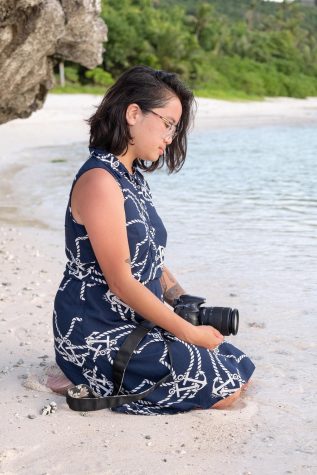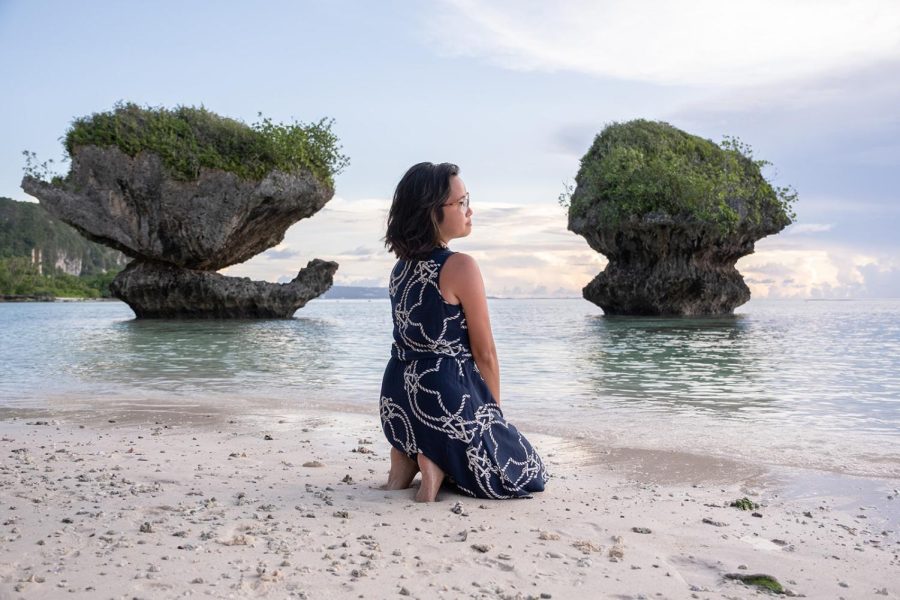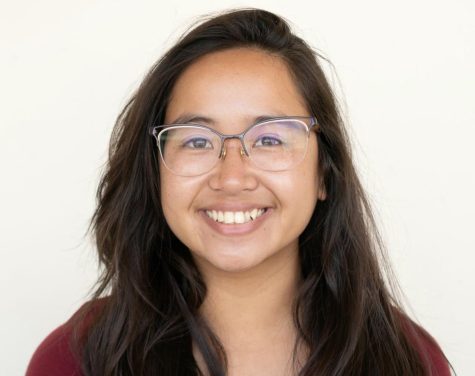I left my heart on Guam when I chose to come to San Diego for a better education.
Like a long-distance relationship, I yearn for that other half of me. Never completely whole, there is solace in knowing our love is forever and she will always be waiting for me.
Leaving home for better opportunities is nothing new to the population. We are called the CHamoru diaspora. I feel especially homesick during Mes CHamoru, a month-long celebration of our culture and history. In honor of the occasion I’m going to start referring to Guam as Guåhan, the CHamoru term for Guam.
When I do go home, I feel as if the island missed me. The smell in the air tells you there’s a beach nearby because it is everywhere. I miss the humidity embracing my whole body when I step out of the airport. Being home, life felt effortless and simple.
I miss the communal understanding of inafa’maolek (eenahfa-mowlek), it’s the foundation of our culture and our souls. It means to keep harmony and to take care of our community. This unspoken agreement was the source of my belonging.
In San Diego, I feel like I have to fight for my CHamoru self to be seen. I want people to know what I am and where I’m from because so few people know what Guahån is. That ignorance deems my CHamoru identity invisible – the part of me that is still at home.
That part of my identity is so important to me. I get mental fatigue from having to spread awareness of Guåhan – as if every day I must shout my name at the rooftops or else I disappear.
That ignorance has been the main source of why I struggled with my identity.
Was I American or CHamoru? Is it worth learning about my culture when no one will know what I’m talking about anyway? Being American was easier. We had the template: a nuclear family with a white picket fence, English-speaking, the “American Dream.” Throughout my higher education, I’ve learned that very point is the reason why we know so little about our heritage. Through generational trauma and a colonial mindset, we have been taught that we, as a territory, will only be successful if we conform to American values. Our path as CHamoru has been erased by centuries of colonialism. We must be brave and carve our own paths again to reclaim our story and our pride, just as our ancestors navigated the seas like it was their own backyard.

I sat at the Asian Pacific Islander Desi American Resource Center’s Mes CHamoru event hoping to feel seen. I was nervous for some reason as if the lack of attendance would solidify my invisibility.
“Who identifies as CHamoru?” asked Dr. Virginia Loh-Hagan, Director of the APIDA Center.
Only myself and one other person raised their hands.
Then I met four other students who were born and raised in Guåhan! They came late following “CHamoru standard time” aka we’re always late. They were fresh from the island. We were relieved to meet each other, and shared our occasional waves of loneliness that come from being away from Guåhan. It was a familiarity I’ve longed for.
If y’all are reading this: Thank you for making me feel at home again.
My move 6,000 miles away is felt especially at San Diego beaches. Locals say they are the best in the world and gush about how beautiful San Diego sunsets are. I’m sorry, but I’ve seen better.
Nothing beats the beaches in Guåhan. The silky sand runs between my toes like I’m stepping on flour and the ocean is more clear than the water I drink.
The sun rises and sets with a beautiful mess of orange, red, yellow and pink. Its colorful light show bounces off the clouds, shifting every minute in front of your eyes. It is our own aurora borealis. The sky is rarely barren as the cumulus clouds graze the sky. The night skies look like the universe spilled a jar of glitter all over a black poster board.
I don’t connect with the beaches in San Diego like the ones back home. It’s unlike anything I’ve experienced before. The ocean would carry me as I would float on my back. It was steady, gentle, encouraging me to lean into the stillness and embrace the serenity. There are no picturesque reefs to calm the waves in the Pacific Ocean like Guåhan has.
I could still feel the currents gently rocking my body as I lay in bed hours later.
It’s magical.
I wish I could go back to where my heart waits, but it’s not possible yet. I came to San Diego for a better education and opportunity that my home cannot provide me. I wish I could live in Guåhan forever, but for now our distance only makes my love for you grow stronger. I’ll come home soon.
BIBA Mes CHamoru!









